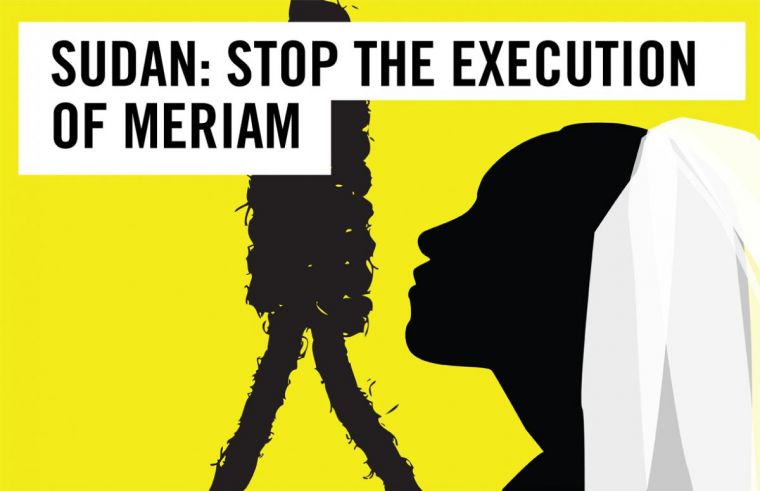Meriam Yehya Ibrahim death sentence is not religious issue, says Sudan, while Christians debate whether it is Islamic

When news broke last week of a pregnant Christian Sudanese mother being sentenced to death for apostasy, the World Evangelical Alliance released a statement saying that such a ruling was not only a "blatant violation" of international human rights laws and Sudan's own constitution, but also Islam and Sharia.
Meriam Yehya Ibrahim is eight months pregnant and behind bars with her 20-month-old son. The reason for her woes? She married a Christian man and considers herself to be a Christian, but her father, who walked out on the family when she was six, was a Muslim. In the eyes of the Sudanese authorities, that makes her a Muslim and her marriage to a Christian man void.
After refusing to recant her Christian faith, the death sentence remains in place but will be stayed until her baby is two years old.
"Handing the death sentence to a citizen just because she was raised as a Christian is unimaginable in today's world," said Godfrey Yogarajah, executive director of the World Evangelical Alliance's Religious Liberty Commission.
"Her marriage has also been declared as 'illicit' relationship, and she has been sentenced to flogging soon after she gives birth to a child. This is unthinkable brutality.
"It is also distortion of Islam and Sharia, which are often used as an excuse for restricting rights.
"Most Muslims believe the Qur'an is about justice, which is also the purpose of Sharia. The sentence does not serve this purpose."
This however is not a perspective shared by Elizabeth Kendal, who was principal researcher for the WEA's Religious Liberty Commission before going independent in 2009.
She contends in her blog that Khartoum's rulings are "totally consistent with Islam".
"Anyone who says the rulings in Khartoum are a 'blatant violation . . . of Islam and Sharia' is either misinformed or is seeking to misinform," she writes.
"Islam underpins not only these rulings out of Khartoum, but much Islamic violence, much Islamic repression and many thousands of honour killings committed annually along with the impunity afforded the perpetrators."
Kendal concludes that the issue really at the heart of it all is freedom, something she insists Islam curtails.
"The details however are totally irrelevant and must not be allowed to become a distraction. Every human being - no matter how or where they were raised and irrespective of their occupation or status - must be free to seek after God," she writes.

"The debate must be about Islam's total lack of liberty, its inherent inhumanity and its gross unreasonableness in suggesting that a good God would compel people to worship and serve him against their heart and conscience."
Sudan's own take is that freedom of choice is a "cornerstone" of Islam and as for the particular case of Ibrahim, it is "neither religious, nor political, it is legal".
Their position was conveyed in a statement put out by the Sudan Embassy to the US.
In the statement, Sudan notes "with regret" the media coverage and official statements that have been issued in response to Ibrahim's death sentence, which have "mistakenly accused" the Sudanese government of violating her human rights.
"This case remains a legal issue and not a religious or political one," the statement reads.
"It is unwise and dangerous to politicise the issue at hand to spur religious tension between the two peaceful faiths with similar foundations. Notably, it is important to emphasise that freedom of choice is the cornerstone of both Islam and Christianity.
"While reaffirming the commitment of the Government of Sudan to all human rights and freedom of beliefs, the Embassy of Sudan in Washington DC would like to thank all those who have raised their concern and sympathy on this issue."
The case has certainly made the world sit up and pay attention, with Amnesty International immediately appealing to people to take action by contacting the Sudanese embassy via a pre-written letter on their website.
So far, over 620,000 people have taken action, Amnesty says. Add to that the 335,000 who have signed a separate petition calling for Ibrahim's release on Change.org and that's close to a million voices speaking up for her.
But Leslie Loftis over at The Federalist notes that Ibrahim's case has not engendered the same reaction as the abduction of the Nigerian schoolgirls, at least in the US press. While even Michelle Obama threw her wait behind #BringBackOurGirls, the big media outlets have been much quieter on Ibrahim and, notably, there has been no hashtag campaign in her name.
"The Christian persecution in this story isn't as easy to hide under the more socially-acceptable oppression to complain about: patriarchy," writes Loftis.
The White House's National Security Council has strongly condemned Ibrahim's sentence but her husband Daniel Wani, a South Sudanese with US citizenship, has expressed disappointment over the lack of urgency on the part of the US authorities to help his wife.
"Considering I am an American citizen, I am disappointed with the American Embassy's position from the beginning of the whole case," he was quoted as saying by Al Jazeera.
"At the start of the issue, I reported it to them but they didn't take much interest, particularly the consulate. They said they didn't have time. In fact last time, they said they didn't care much about the case. They came late - they intervened when they saw the issue was getting press attention - but the intervention was late."
Amnesty says Ibrahim's lawyers filed an appeal at the Appeal Court of Bahri and Sharq Al Nil on Thursday. If the appeal is unsuccessful, they are planning to explore further avenues, and take the case to Sudan's Supreme Court and Constitutional Court.
Ibrahim and her husband face a long, difficult and possibly lonely struggle for freedom.











